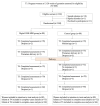Effectiveness of Digital Guided Self-help Mindfulness Training During Pregnancy on Maternal Psychological Distress and Infant Neuropsychological Development: Randomized Controlled Trial
- PMID: 36763452
- PMCID: PMC9960047
- DOI: 10.2196/41298
Effectiveness of Digital Guided Self-help Mindfulness Training During Pregnancy on Maternal Psychological Distress and Infant Neuropsychological Development: Randomized Controlled Trial
Abstract
Background: Maternal psychological distress during pregnancy is associated with unfavorable outcomes in infants. Mindfulness-based interventions (MBIs) can effectively alleviate psychological distress, but there are often barriers to the access of face-to-face interventions.
Objective: This study aimed to investigate the effectiveness of a digital guided self-help (GSH) MBI (GSH-MBI) in reducing maternal psychological distress and improving infant neuropsychological performance.
Methods: This was a randomized controlled trial. We recruited 160 women who were 12 to 20 weeks pregnant and exhibited psychological distress. We randomized them into a digital GSH-MBI group and a control group (usual perinatal care). The digital GSH-MBI consisted of a 6-week intervention through a WeChat mini program, with a daily reminder sent to the participants by a research assistant via WeChat. The primary outcomes consisted of maternal psychological distress, including depression, anxiety, and pregnancy-related anxiety symptoms, which were assessed at 6 time points from baseline to 6 months post partum (only pregnancy-related anxiety symptoms were assessed 3 times during pregnancy). The secondary outcomes were infant neuropsychological outcomes, including temperament and developmental behaviors, which were assessed at 6 weeks and 6 months post partum.
Results: Compared with the control group, the digital GSH-MBI group showed a significant reduction in depression, anxiety, and pregnancy-related anxiety symptoms. In addition, the scores of the digital GSH-MBI group were lower than those of the control group for the 3 types of infant temperament at 6 weeks post partum, including quality of mood, distractibility, and adaptability.
Conclusions: Digital GSH-MBIs are effective in alleviating psychological distress among pregnant women and protecting infant outcomes.
Trial registration: Chinese Clinical Trial Register ChiCTR2000040717; https://www.chictr.org.cn/showproj.aspx?proj=65376.
Keywords: digital; guided self-help; infant; mHealth; mindfulness; mobile health; neuropsychological performance; pregnancy; psychological distress; psychosocial intervention.
©Xuan Zhang, Yang Li, Juan Wang, Fangxiang Mao, Liuliu Wu, Yongqi Huang, Jiwei Sun, Fenglin Cao. Originally published in the Journal of Medical Internet Research (https://www.jmir.org), 10.02.2023.
Conflict of interest statement
Conflicts of Interest: None declared.
Figures




References
-
- Ghimire U, Papabathini SS, Kawuki J, Obore N, Musa TH. Depression during pregnancy and the risk of low birth weight, preterm birth and intrauterine growth restriction- an updated meta-analysis. Early Hum Dev. 2021 Jan;152:105243. doi: 10.1016/j.earlhumdev.2020.105243.S0378-3782(20)30747-7 - DOI - PubMed
-
- Barker DJ. The origins of the developmental origins theory. J Intern Med. 2007 May;261(5):412–7. doi: 10.1111/j.1365-2796.2007.01809.x. https://onlinelibrary.wiley.com/doi/10.1111/j.1365-2796.2007.01809.x JIM1809 - DOI - DOI - PubMed
-
- Hofmann SG, Gómez AF. Mindfulness-based interventions for anxiety and depression. Psychiatr Clin North Am. 2017 Dec;40(4):739–49. doi: 10.1016/j.psc.2017.08.008. https://europepmc.org/abstract/MED/29080597 S0193-953X(17)30076-X - DOI - PMC - PubMed
Publication types
MeSH terms
Associated data
LinkOut - more resources
Full Text Sources

